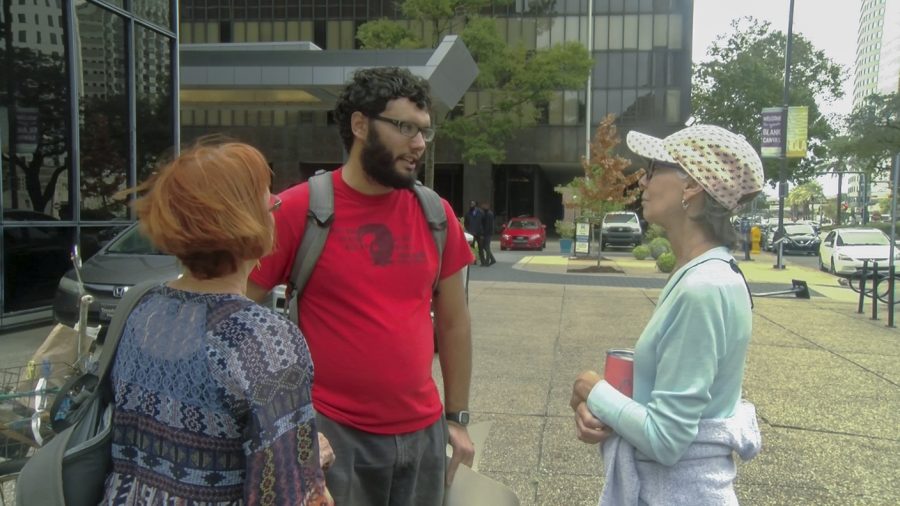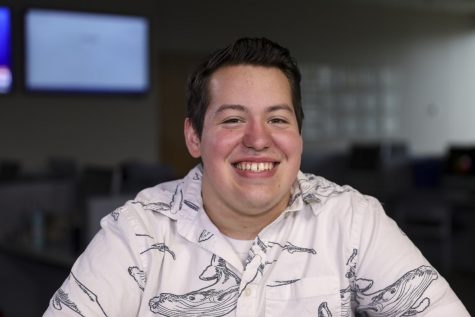Detention centers bring immigration discussion to Louisiana
Daniel Werst speaks to other protesters in front of the ICE office in New Orleans Oct. 12. Werst said he supports an open border policy. Photo credit: Cody Downey
November 5, 2019
Though the topic of immigration may feel far away for most Louisiana residents, the presence of detention centers across the state brings the topic closer to home than some might expect.
According to New Orleans Coalition to Close the Concentration Camps organizer Mike Howells, the state of Louisiana has come to hold a significant number of detained illegal immigrants.
“The fact is that Louisiana is ground zero for Trump’s war on immigrants and we have seen since Trump’s been inaugurated a huge increase in the number of people being held in Louisiana,” he said.
The New Orleans Coalition to Close the Concentration Camps is a division of a nationwide organization that advocates for the closure of all Immigration and Customs Enforcement detention centers, first and foremost in Louisiana, because the group views them as a human rights violation.
“Our attitude is somebody shouldn’t be treated like a criminal simply because they are attempting to pursue a better way of life,” Howells said. “It’s no more immoral for somebody to move from Honduras to Louisiana in search of a better life than it is for somebody from Louisiana to move to Texas in search of a better life.”
Across the state of Louisiana, there are more than a dozen detention centers that hold a total of 8,000 detained illegal immigrants, according to AP News.
“When we passed detention reform a while back in Louisiana, it opened up a lot of prison space,” immigration attorney Michael Gahagan said. “We’ve become the go-to place to store immigrants while they wait for deportation.”
According to Gahagan, many U.S. presidents have done things differently in terms of reforming immigration law, ignoring things established in the Immigration and Nationality Act, which was signed originally to end discrimination against non-Northwestern European immigrants.
“No president, for whatever reason, wants to follow it,” he said. “The more liberal presidents create exceptions to what is a hard, fast rule and more conservative presidents seem to be finding more ways to deport people.”
Howells said the placement of ICE detainees in Louisiana is mutually beneficial for Louisiana politicians and President Trump.
“We already have a state where the prison industrial complex’s political influence over the state legislature and the governor is out of control,” he said. “But, at the same time, now with bringing in all these ICE detention centers and the Trump administration’s support of the ICE detention centers, we have a situation where the prison industrial complex’s clout in this state is going to increase.”
One person who shares some of the beliefs of the coalition is protester and teacher Daniel Werst. Werst, a native of Illinois, said he fully developed these beliefs in New Orleans after spending three years in construction with a group of Honduran immigrants.
“These people can’t complain as easily as someone who does have citizenship can complain if something is unsafe or their boss is harassing them,” he said. “To me, that was the biggest thing because you see people who work long hours, who do actually physically harder work like roofing. People who are worried about where their kids are going to be or have family members who are in danger in their home country.”
With his job as a teacher, Werst said his connections with students from Central America have given him a greater sense of empathy.
“If I imagine how I would feel if someone were to arrest the parents of my kids, I think that’s just terrible,” he said.
Werst, who is also a communist, said his ideal policy would be for open borders. Proudly wearing a shirt with a quote from German Marxist Rosa Luxemburg, Werst said he knows his views aren’t taken seriously, but still decides to hold onto them.
“Definitely the kind of politics I believe in are often viewed as somewhat unrealistic, but I feel, in my personal life, that they prepare me to be honest with the 16-year-old from Honduras who doesn’t know exactly where his siblings are,” he said. “I can be honest with that person and be on their side.”
With the U.S. currently holding 51,000 immigrants across the country, Gahagan said many of these people do know what they are risking but are most times willing to take that risk.
“They are willing to chance a lot of times overstaying their visa. They know it’s wrong,” he said. “But, they are trying to survive. It comes down to simple survival. (It) is ‘I want to help my family back home eat.’”








